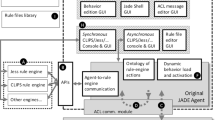Abstract
Mobile agent system raises significant security concerns and requires a thorough security framework, with a wide range of strategies and mechanisms, for the protection of both agents and agent hosts, against possibly malicious behavior. Researchers have identi?ed several security attacks. In general, the behavior of mobile agents is often prescribed by the set of tasks represented in an itinerary. The design and implementation of an itinerary can be a complex, time intensive task. A mobile agent running on a host may attacks, if the host is malicious. The attacks may be on the agent’s static data, its collected information (dynamic data) and its itinerary. Hence itineraries must be made secure, in order to get secure agent behavior. In this paper, we propose the development of protocols, which provide security and robustness to different kinds of agent itineraries and present a comparison of the performance of these protocols with some existing ones.
Preview
Unable to display preview. Download preview PDF.
Similar content being viewed by others
References
Borrell, J., Robles, S., Serra, J., Riera, A.: Securing the Itinerary of Mobile Agents through a Non-Repudiation Protocol. In: IEEE International Carnahan Conference on Security Technology, pp. 461–464 (1999)
Westhoff, D., Schneider, M., Unger, C., Kenderali, F.: Methods for Protecting a Mobile Agent. In: Zheng, Y., Mambo, M. (eds.) ISW 1999. LNCS, vol. 1729, pp. 57–71. Springer, Heidelberg (1999)
Mir, J., Borrell, J.: Protecting General Flexible Itineraries of Mobile Agents. In: Kim, K.-c. (ed.) ICISC 2001. LNCS, vol. 2288, p. 382. Springer, Heidelberg (2002)
Author information
Authors and Affiliations
Editor information
Editors and Affiliations
Rights and permissions
Copyright information
© 2006 Springer-Verlag Berlin Heidelberg
About this paper
Cite this paper
Singh, R., Kaur, N., Sarje, A.K. (2006). Secure Itineraries Framework for Mobile Agent Systems. In: Bagchi, A., Atluri, V. (eds) Information Systems Security. ICISS 2006. Lecture Notes in Computer Science, vol 4332. Springer, Berlin, Heidelberg. https://doi.org/10.1007/11961635_28
Download citation
DOI: https://doi.org/10.1007/11961635_28
Publisher Name: Springer, Berlin, Heidelberg
Print ISBN: 978-3-540-68962-1
Online ISBN: 978-3-540-68963-8
eBook Packages: Computer ScienceComputer Science (R0)




